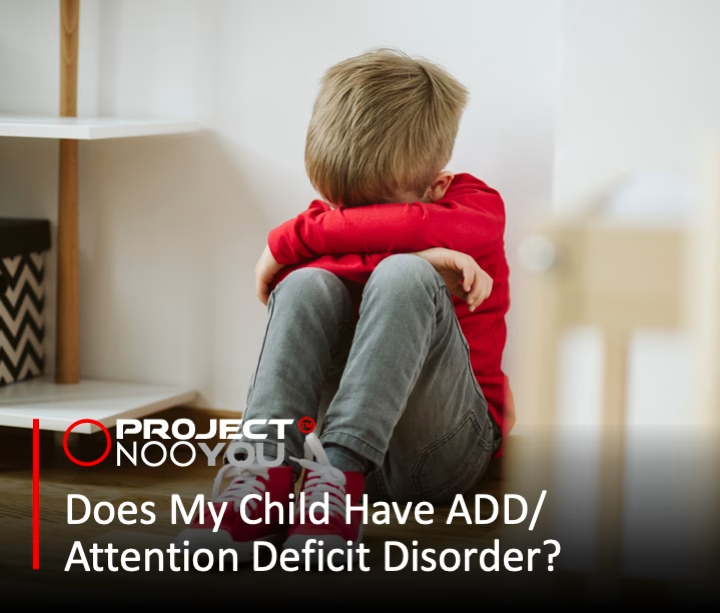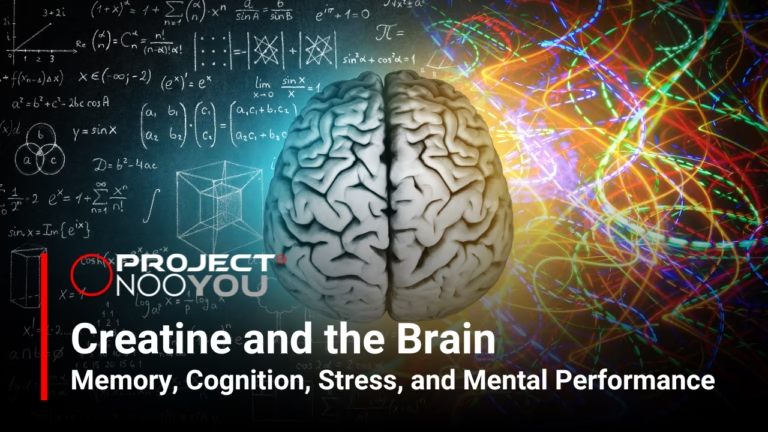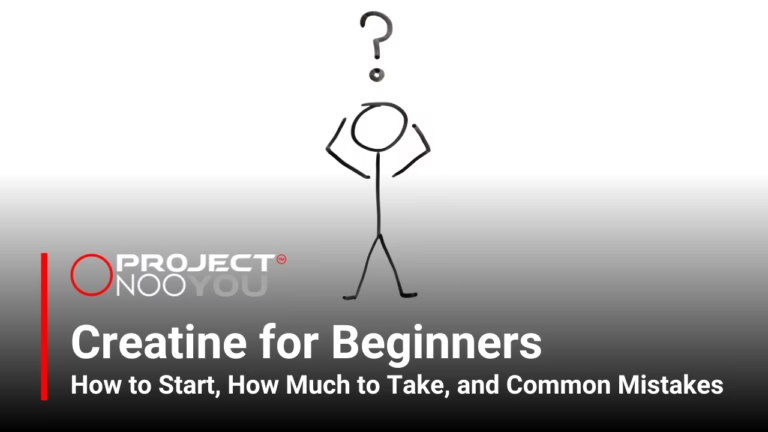Does my child have ADD (Attention Deficit Disorder)?
To listen to the audio recording of this blog post click the play button below.
This question is being asked by parents more and more frequently as the number of children suffering at school from focus, behavior, and boredom issues increases.
But what is causing this rise in ADD sufferers, should you be concerned if your child has ADD or ADHD (ADD being Attention Deficit Disorder and ADHD being Attention Deficit Hyperactivity Disorder), and what (if anything) should you do about it?
My name is Mark, and I am the founder of Project Noo You and the creator of the NITROvit formula – a formula I created for my own Attention Deficit issues to avoid the mind-numbing prescription drugs given to me when younger.
Having suffered with ADHD all my life, I would like to share my experiences growing up with it so you as a parent can better understand what you are dealing with.
I will also shed light on whether you should be concerned or not – and how you can help your child to ‘make the most’ of their ADD condition.
What are the signs of a child with ADD?
There are many signs your child may have ADD, but I am going to highlight those that I personally suffered with to a high level growing up – and in many ways still do today:
- A lack of ‘being present’ when around you, your spouse, their classmates, teachers, and even friends
- A ‘disengaged’ attitude toward the mundane – school, chores, family time, and even socializing
- Difficulty maintaining friendships/relationships without getting bored and ‘discarding people’
- The inability to focus or concentrate on repetitive or uninteresting/inspiring tasks
- An inability to organize or structure even the simplest of things
- An apparent ‘thoughtless’ or selfish attitude
- An extreme range of energy levels that can rapidly fluctuate from lethargy to excessive hyperactivity
- Constant leg tapping, fidgeting, or the inability to converse or listen unless playing with or holding something such as a pen (or anything that’s in proximity) EDIT: I’m reading this back through whilst drumming my leg and clicking a pen… I’m now laughing out loud as I wrote this 2 years ago and nothing has changed Ha-ha!
- An intense obsessive nature toward the latest fad or hobby – before losing all interest in it after mere weeks
- Excessive talking or rambling hopping rapidly from one topic or point to another
- A ‘distancing’ themselves from you or others such as always walking 10 yards ahead
- Extreme variants in personality ranging from a complete introvert to an overpowering egomaniac – though this has greatly improved with age for me (I think)
Why is ADD and ADHD on the rise? (My theory)
According to The Center for Disease Control and Prevention (CDC) 11 percent of US children aged 4 – 17 in 2016 were diagnosed as having ADHD. This number of course only reflects those that have been evaluated.
The ‘concern’ is that this is a 43 percent increase since 2003 – and once the next study results are in, I suspect the increase to date will be even more startling.
But is there cause for concern? Well I’ll come to that shortly, but first let’s look at why more and more children are showing the signs of ADD and ADHD.
Science to date has failed to fully understand what is happening here – but then I do sometimes feel science relies too much on hard data.
OK, while I appreciate scientific data is the backbone of understanding, I do think too often we get hung up on having to find clear recordable markers – especially when another theory may refute said data.
Take love for instance. I love my wife more than anything, but a scientist would have a hard time proving that, beyond perhaps highlighting that certain brain activity may increase when I’m shown a picture of her.

A scientist may record an increase in my heart rate when I think about how attractive she is to me, yet would struggle to monitor and chart those ‘butterflies’ I feel in my stomach too.
I often question ‘science’ as when younger I suffered horrendous panic attacks – 18 months I relied on science to pump me full of prescription ‘cures’, driving me to near suicide when I was 23…
After almost giving up on life, a Hypnotherapist called Gloria then ensured I never experienced another attack in my life – by simply talking to my unconscious mind for a few hours.
And so, with that said, I’m going to tell you (unscientifically and yet with full confidence and conviction) why I believe the number of children just like yours, are finding it harder to concentrate, to engage, and to simply be content, grateful and happy…
The world is changing, and our education system hasn’t kept up… And video games have a part to play
(This section is lengthy, but I feel it is important and likely equates to a good percentage as to why ADD is on the rise.)
In my mind, the way we teach and what we teach seem to be at the root of it… And technology isn’t helping.
(Note: I taught and worked with children in 3 schools over 2 years so saw evidence of my theory first-hand)
I’m a gamer, and I can tell you that over the past 40 years, video games and their level of complexity and realism has increased to a point where telling the difference between a video game and reality can often blur.
Think back to the movie Avatar and the world of Pandora… People in the first few weeks of Avatar being released were taking their own lives.
The comedown to reality and the mundaneness of their lives was too much.
For months after, the Avatar forum Naviblue was flooded with suicidal people desperate for help.
Take the Transformers movies where if we knew no different, we’d swear those robots were actually real.
Think Jurassic Park’s Dinosaurs.
CGI is becoming so mind-blowing that nearly all action/fantasy movies are filmed 95% in front of greenscreens now without traditional ‘sets’.
The video game world is the same…
The graphics in some games is so realistic now that when my onscreen character is scaling a height in a game – I physically feel the symptoms of vertigo.
When my character gets shot in a game – I often flinch myself, and when I make a decision in a game that leads to an undesired outcome – I genuinely feel remorse and think about the ‘what ifs’ for days.
That is how engrossing video games are becoming.
So here’s my point…
How video games are enhancing ADD and ADHD…
Little Timmy wakes up at 7am, washes, brushes his teeth, and gets dressed.
I largely suspect sitting at the family table for breakfast is not on his list of priorities and he’s worked out long ago that eating a round of toast on the way to school is going to free up 15 more minutes of game time.
So, he has himself some 25 minutes he can spend doing whatever he wants before the school bus arrives – and I suspect he’ll be spending that time with his PlayStation or computer.
And here is where the conflict lies.
Timmy puts on his Virtual Reality headset before school and is suddenly immersed in a world where he is finally a superhero and savior of the universe.
He is not just another unknown kid in a class of 40, a school of 400, but rather the commander and chief of the greatest Army on the planet – fighting a wave of invading space aliens with the fate of the world in his hands.
He isn’t playing with a diecast Hot Wheels car on his bedroom floor as we would have in our day – he is playing ‘Need for Speed’ and behind the wheel of a 2021 Lamborghini Huracan…
The graphics so immersive that his mental state and adrenal system are reacting in the same way as if he were behind the wheel of the real vehicle itself.
203 mph head to head racing online against his best friend, with his heart pumping out of his chest…
…And then his virtual world is rudely interrupted by you shouting…
“TIMMY – Turn that off and get to school!”
In game he begrudgingly parks his Lamborghini, lays down his sniper rifle, or lands his Apache Gunship, takes off the headset and puts down the controllers…
And then goes to school to sit at a 50-year-old wooden desk to be ‘talked at’ for 7 hours by someone he cannot relate to, about some historical nonsense that happened 800 years ago!
And we wonder why our children are disengaged at school and staring out of the classroom window?
The fact that the ratio of boys with ADD versus girls is 3:1 suggests I may well be right – seeing as gamers tend largely to be boys.
When it comes to sheer entertainment value – poor old 46-year-old substitute Geography teacher ‘Mr. Anderson’ doesn’t have a chance competing for Timmy’s attention against the Apps and games on his new iPhone 12!

So, what should we do about it? Is banning video games the way forward in combatting ADD?
In my honest opinion – no.
If you search Google Images for “Virtual Reality” you’d expect to see nothing but images of kids with headsets on playing games… But that isn’t the case.
My screen is showing 20 images – of which just 2 show children gaming – and 18 show adult engineers, doctors, scientists – all wearing headsets to create advanced solutions for the future’s complex issues – Surgery and advanced architecture for example.

Our children’s futures will require no knowledge of woodworking – for every chair, table, and window frame will be 3D printed – using software similar to that that your child wants to get familiar with now.
Their futures will have no real use for 5 years’ worth of Geography study – for their driverless cars will team up with their satellite navigation systems and take them wherever they wish to go.
To a degree, even history will have no place in their lives, because the rapid evolution of technology will only favor those who look forward to the future and its unsolved problems, not backwards to the mistakes already learned from.
Courage, creativity, street smarts and problem-solving abilities, the ability to inspire and lead – these will be the skillsets required for their future, and video games teach that in abundance… And ADD can provide those skills too.
I say let them immerse themselves online and don’t fret over a child who only appears engaged when staring at a screen, for that screen will well equip that child for a future you and I won’t recognize.
I say let the education system catch up and find ways to make itself more engaging, rather than hold our children’s potential back so that they fit into an archaic mold for the sake of a pleasing exam result you get to boast to your friends about.
And if it can’t catch up then that is not our business.
More and more we are starting to realize that the conventional model of an ‘intelligent child’ has little relevance these days.
It has long been reported that the ‘best performing’ students come exam time are not necessarily the most intelligent, but in fact just have better memories. A great skill to have – but not one that will guarantee future success.
It has long been said that the most important person in the businesses of tomorrow will be the CCO – the Chief Creative Officer – the person who can imagine and envision new products and services no one has even thought could exist yet.
Far too many genuinely intelligent children slip through the net and are written off by schools – labelled as disruptive, uninterested, and headed nowhere – because the conventional education system cannot entertain their rapidly evolving minds.
And YES! I’m potentially talking to you about YOUR child.
To wrap up my point on education and ‘screen time allowance’ is to simply say, if your child seems to have no interest in school or homework, and instead only wishes to engross themselves in the online world – I wouldn’t panic.
This world in 10 years’ time will look nothing like today and many of the jobs that currently need filling will have been made obsolete by automation (robots) and Artificial Intelligence.
The leaders of the future will be the dreamers – the Elon Musk’s, the Steve Jobs, the Mark Zuckerberg’s – all people who cared less for school yet created solutions in their heads to problems and had the tech know-how to bring them to reality.
OK, I admit Zuckerberg’s creation and its good in the world is questionable – but Musk’s determination to seek alternative planets for us to inhabit is admirable.
Even a dummy like me, who spent all day daydreaming and as a result was grassed on to my parents by teachers with reports saying ‘he’ll amount to nothing’ – created the NITROvit ADHD supplement that has changed the worlds of thousands of people.
“I get your point Mark, but can I get my child more engaged somehow at school to ease their misery?”
I will say this; homework will always need to be done, and some level of attention will always need to be shown.
But to help your ADD child do better in school, try to take an interest in the subjects they are.
This may be IT/Computer skills, media studies, or sport, and dare I say it – YouTubing, Streaming, and Influencing…
For they will already be suffering from the monotony of sitting through the subjects they loathe, so engage with them on the subjects that bring a spark to their eyes – no matter how pointless that subject or interest may seem to you.
As a teenager I found less and less common ground with my parents and through no real fault of their own I left home for the first time just before my 16th birthday.
I felt ready to face the world and my ADHD gave me the confidence to talk a sales company into giving me a door to door sales job (despite it being illegal at that age) and paying me cash in hand.
Had myself and my parents worked a little harder to find common ground, I’d have likely spent much more time talking with them and opening up about my vision and goals for my future.
Try this if your ADD child struggles with assignments
Most children with ADD feel alone and alienated as they don’t fit in with the norm, so taking an interest in whatever they are into will bring you some joy if you’d like more out of the parent/child relationship.
Learn what they are good at and then when it comes homework time show them how they can apply that to the topic.
Most of us ADD’ers are highly creative with great imaginations…
So think along the lines of ‘if Susan has 4 dragons, and she finds another 2 how many dragons does she have?’ – as opposed to Susan having 4 apples.

If an English assignment is due in in 2 days, spend the first day encouraging your child to draw a picture or make a model of the hero or heroine in the story – or the thing in the essay that most appeals to them.
With a model made or picture drawn you’ve already wetted their imagination and appetite as to how fun this essay can now be when it comes to the writing.
They’ll be much more inspired and have something visual and tangible to think about on day two when putting pen to paper.
And if the homework is Mathematics then get some modelling putty and make those 4 dragons… Oh, and don’t forget you’ll need to make 2 more.
If they have a history assignment due in in a week then you have lots of time to take them to the actual place the event happened, if local…
With the cameras on their smartphones to record video and take pics of the day, they’ll be much more motivated to get stuck into the writing once back home.
Exercises like this can bring some positivity to their perception of school and that will spill over into the other subjects too.
Also, try to see beyond the exam result or your perceived value of the qualification, and instead look at the lessons learned from their favorite subjects.
A passion for Drama class will teach your child confidence, a love of art offers increased creativity, and computer classes and web design will sharpen their problem-solving skills… All invaluable in their future.
Ultimately work ethic is the most essential tool for success and encouraging engagement in something you consider a waste of time, rather than pushing your own agenda and causing complete resentment toward any schooling, will better benefit your child in the long run.
In summary, the world is changing at a rapid pace and parents must accept that what we know, based on our own childhood, may not actually be what’s best for the children of tomorrow’s world.
Your child’s future will be dominated by screens/tablets/computers/Apps…
Allowing them the time they want with these devices can only be a good thing.
Unless your child has a clear goal of becoming a Pilot, a Lawyer, or Biophysicist, relax a little and don’t be too quick to push them towards the traditional subjects and ways of doing things.
Google employs 115,000 employees on some of the largest salaries in the country, and Google didn’t even exist when we were at school.
And don’t even get me started on the number of 18-year-old millionaires who made their money through designing and creating the Apps and software that fill our smartphones.
Apps didn’t even exist 12 odd years ago and here we are today using them to run this planet – to power our banking, hospitals, and space flights!
If little Timmy says ‘Mum, I want to learn to make an App’ – my god woman get him a private IT tutor quick fast and look forward to the possibility of a nice early retirement yourself!
What should we do about the other issues you highlighted regarding my child’s ADD symptoms?
At the start of this article I gave you some well-known traits shown among children with ADD and ADHD.
Let’s take a look at a few of those I haven’t mentioned yet and I’ll cover, from my experience, what’s going on and how to best handle it.
ADD Issue 1) A lack of ‘being present’ when around you, your spouse, their classmates, teachers, and even friends
When I was a child, I was always 10 steps ahead of my parents, and my father never appreciated that.
He took it personally and assumed I was making a statement about my lack of interest in the family.

He was very wrong. The reason I was always ahead is because my brain had processed what I had seen, had gotten bored, and needed to explore what was next.
Put this in context with a Zoo visit. You, your partner, and your ADD child are at the Zoo and you come across the Bear enclosure.
Impressive to you, you stop, take it all in, and then look toward your child to comment on the Bears.
But they aren’t anywhere to be seen.
20 meters ahead and there he/she is already looking at the Lions in the next enclosure.
To a parent this can be frustrating and can come across as the child being ungrateful.
Zoo trips can be expensive, and it seems your child doesn’t have much interest at all and will be done and wanting to go home before you know it.
This isn’t actually what is going on however.
Your child has simply already processed the Bear, found little interest in it sitting there, his/her brain has now sought the next point of interest and they’ve wandered off to see the Lions.
The Bear was appreciated, and due to lack of interest – or the spotting of the next bright shiny object (the Lions) – has been drawn on to the next enclosure…
The Lion’s constant pacing, snarling, and unpredictable nature being of much greater interest – for at least 45 seconds anyway. And so it goes on.
Your child is not in control of this behavior however… Fault in this case lies with their brains constant need for stimuli.
Now bring them back and play dumb…
“Timmy, Mum and I can’t work out which is oldest Bear, and which is youngest Bear… Do you know?”
“OK, thanks. What makes you think the one on the left is the oldest?”
“And what do you think they eat? Do you think that big one has ever eaten a boy just like you?”
You should at least get a smile…
Any question that has your child feeling like they may educate you (and subsequently make you proud) is a great question.
Any question that makes them feel you respect their opinion and respect that they are great at ‘figuring things out because they are smart’ is a great question.
So, rather than scold and pull them back to stand in silence whilst you look at the Bears, work with them.
When you get home, get out some more of that modelling clay and tell your child if they can make a model of their favorite animal they saw today – you’ll be their first customer and pay them 2 dollars for it… But only if it’s good enough that you yourself can guess what it is.
Now sit back, get comfy and enjoy the next 3 hours (largely in peace) as you witness the most engrossed and engaged child on the planet!
Bribery is a wonderful thing, and what’s 2 dollars if it gives you a better understanding of how your child’s fast processing brain actually functions.
I guarantee they’ll create the best Lion you ever saw – proving that they did take it all in at the Zoo today – more than you did most likely- despite them tearing ahead.
Again, this behavioral pattern has nothing to do with not wanting to be with family or that you may be cramping their style, and everything to do with how fast your child’s brain is operating, dissecting, and seeking more stimuli.
If they do seem despondent around you it’s because you are almost certainly making them feel they are being held back.
While maintaining an eye on them, let them tear ahead and then ask them to come and get you once they have found something of interest to them.
Creating an environment where they are offered the responsibility of playing adult (bearing in mind it was only this morning they were Chief Commander of a Starship on their hyper-realistic video game) will actually have you earning their respect instead of resentment.
Rather than take offense or feel sad that they aren’t appreciating the trip, be grateful and understanding of the fact that you have a very smart child who is absorbing data and information like a sponge.
Also, have a small amount of sympathy. It can be as exhausting for them with their brain’s constant desire for stimuli as it can be for you.
Having ADHD is like having 1,727 internet browser tabs open… All at the same time!
ADD Issue 2) A ‘disengaged’ attitude toward the mundane – school, chores, family time, and even socializing
For me, monotony is sickeningly painful. Anything that needs to be revisited is a complete and utter chore.
I know as I power through the draft of this article, with my dodgy grammar, that I’ll really have to reread this when it’s done and make the corrections as best I can… And the thought of that makes my head spin.
I want to do one thing once and have done with it. My brain has ‘read it once’ as I think and type and so to then go back to the beginning and start again makes me want to vomit. BOOOOORING!
In some children this can roll over into family and social circles. Visiting Grandma every week with little to no change in stimuli can quickly make your child despondent.
They aren’t being rude… They are simply reacting the way you would if your child sat and wanted to talk to you for 2 hours about Fortnite, their favorite K-Pop band or Twitch Streamer, or why they shouldn’t go to school tomorrow.
There isn’t too much you can do about this, but to ease things, perhaps consider cutting the length of time spent visiting down by 15 minutes or so.
Allow them to take and play with their phone, or perhaps take a friend with them to such family gatherings.
Social media is training their brains to keep friendships, but also keep distance. Your children won’t likely put the same importance on family time as we did when we were young.
Frankly, the world has far more stimulating things prying for their attention at an insane rate with so many more options offered to them.
Sadly, the days are gone of huddling round the fire playing cards with the kids for most of us. And I can’t blame them… Electric scooters, Call of Duty, and Hoverboards are all super cool and playing Blackjack with Mum and Dad sadly just isn’t anymore.
So, save that for holidays and let them spend most of their time doing what they love… In the long run I believe your relationship with your child will be better… Especially as they grow older.
Constant battles at a young age can exhaust them and cause them to distance themselves from you in the later years.
My mother and I are building a great relationship now, but my father and I don’t speak. We likely won’t again, and I’m fine with that. We didn’t see eye to eye when I was younger and he and his outlook has not changed.
Whilst I appreciate that for the most part it is ‘your rules whilst under your roof’, demanding your child always does things your way can push them away when they are older and aren’t dependent on you and your roof… Likely at a time in your life when you’d most appreciate a relationship with your child.
Of course, in childhood I accept they must compromise – including helping around the house – but make chores fun by joining in.
Try changing ‘wash the dishes’ to ‘wash the dishes with me’ and ask them about something they like talking about while doing so.
Their interests may be boring to you (so feel free to switch off as they ramble on), but creating common ground by letting them talk uninterrupted will pay out in the end.
And challenge them too and play dumb while doing it…
“Timmy, we need to put all these dirty dishes in the dishwasher so you can go play video games for an hour before bed.
But, unless we stack them in the washer correctly, we’ll not have the room to fit them all in, and I’m not sure how best to do it.
What do you think Timmy? Should we start with the big plates or the small plates first? And how would you stack them in the dishwasher so they all fit?”
Take the emphasis off the chore and challenge their creativity (and egos) and you’ll find yourself with an engaged child who is loving showing you how smart they can be.
You’re bringing the puzzle solving elements found in videogames that buzz their Dopamine levels – and still getting the dishes done! Ha-ha!
Just don’t ever give the secret away until they are much older or have figured your strategies out… Or you’ll lose the interest of your little helper.
ADD Issue 3) Difficulty maintaining friendships and relationships
Many children with ADD and ADHD struggle to find friends. The first point to note is this isn’t necessarily something that should make you feel down. This (as was in my case) is often their choice.
To this day, my best friend in the world is myself. I am happier alone than with friends… My wife comes a close second, but being very independent herself, we allow each other the space when needed to be with ourselves and our thoughts.
The ADD mind is very observant and rarely stops taking in the world around it. This can make what we as parents may consider a mundane walk to the shops an adventure of exploration and discovery for your child.
I, when younger always walked ahead, head down, and silent.
My parents must have thought I was the most unhappiest boy in the world… But I wasn’t.
I was taking in everything, often spotting coins, insects, or things of interest on the floor that most people would walk over.
I was quiet because I was thinking, daydreaming, planning, and imagining.
Every shadow on the ground was a lava trail that had to be leapt over. Every curb a mountain to climb or ravine to jump. Every pile of leaves or sticks a potential hiding place for a monster that needed defeating before we could pass.
When someone is a loner it is often considered a bad thing. But why? People often let us down and yet we rarely let ourselves down.
Some of the happiest people I know are loners who love to be with themselves and their thoughts. And there is always room for friendships – they just need to be meaningful…
I never saw the need to get on with everyone, to fit in, to get along. But I did care for 1 or 2 special friends who got me and allowed me to be who I was.
If your child struggles with relationships or is not making friends at school, this isn’t necessarily something to worry about.
They will meet the right people for them when the time is right, and the only thing of importance is their happiness, not how popular they are or how many Birthday’s they get invited to.
As I sit here now at 43, I’ve become my best friend to such a degree that I adore my space and time alone.
I now thank God for that too, as I know people who were once so popular, they can no longer stand being on their own.
They suffer extreme depression unless their social calendar is filled with coffee dates, walks with friends, or anything that doesn’t involve them being left to their own devices.
Forgive your child if their ADD is keeping them within their own heads. They may well be happiest there. At least for now, until someone likeminded crosses their path.

What he sees: An important breakdown rescue mission requiring all his concentration and effort.
NOTE: It is important to note that my opinion above is based upon your child being uninterested in other children, too preoccupied with their own thoughts and daydreams.
They may also be talking to themselves or an imaginary friend. This in my experience is perfectly normal for an ADD child.
If however you notice your child disengaging from all activity, and spending most of their time moping or simply doing nothing they may be showing signs of depression and a specialist should be referred to.
ADD Issue 4) The inability to focus or concentrate on repetitive tasks over time
My school reports always read the same…
“He doesn’t pay attention”
“He disrupts others”
“He is not interested and throwing his education away”
I’m sure ADD sufferers Sir Richard Branson, Astronaut Scott Kelly, entertainer Justin Timberlake, and even Steve Jobs all had similar report cards – and yet nothing stopped them from relying on their strengths and building a fulfilled life as a result.
Oddly enough, ADD people are some of the most focused people on the planet,
just only when they are working on something they love.
The attention issues kick in when the reward does not outweigh the effort.
If there is nothing exciting to discover, no challenge to overcome, or no problem to solve then we aren’t interested.
This is why we see so many despondent and insular kids at school, who then go on to achieve great things once they leave and find something they are finally passionate about.
You’ll likely have noticed that once something does fire them up, they can become obsessive.
This is often because having a single point of focus can be so soothing for a mind that always races.
Video games often provide this single point of focus. Get to the next base, beat the level, defeat the big boss, and win the game…
Finally, the brain has something stimulating to focus on with the reward of accomplishment upon completion – and a rest from its usual racing in the mundane world of reality where it is endlessly seeking stimuli and thrills.
If your child is struggling to focus it isn’t the end of the world.
Simply observe what does seem to hold their attention and encourage more of it.
And if nothing captures their attention don’t panic. I didn’t know what I wanted to do until I was in my late 30’s!
ADD Issue 5) An inability to organize or structure even the simplest of things
Honestly? – Who cares!
My desk looked like a bomb had hit it when I was young, and it still does today.
I’m sat here writing this now surrounded by endless notes and scraps of paper, spare change, 2 empty cups, books stacked up and all manner of clutter.
I’ll never change. An organized desk doesn’t work for me and nor should it have to. For in my mind, this mess of a desk is perfectly organized, with me knowing where everything is.
It’s pleasing to the eye if someone keeps their work area tidy, but it doesn’t make a blind bit of difference to the results they achieve.

As for appointments and so on, this can be more of an inconvenience.
To this day I can’t book a haircut or dentist appointment… I get anxious at the thought of organizing the phone call and selecting a date! Instead I’ll walk in when I get desperate and sit and wait if need be.
The same inability to organize may be noticeable in your child now – with them pulling out the letter from the school the morning of the school trip – instead of last month when their teacher first put it in their backpack.
Yes frustrating, but you know your child so get ready for these inconveniences.
Helping to organize your child (no matter their age – cough cough Mum) is something they will appreciate and something your energy would be better spent on, rather than trying to get them to ‘change’.
ADD Issue 6) My child develops an intense obsessive nature toward the latest fad or hobby – before losing all interest in it after mere weeks
I sympathize for one reason only – this can get costly!
Here’s my advice for you and it may both save you a fortune, and provide an improved skillset for your child’s future.
When your child says “Dad, everyone has these at school, can I get one?”, ask yourself these two questions:
- Will said new hobby/fad/interest provide happiness and creativity NOW?
- Will said new hobby/fad/interest need time to develop mastery?
If the answer is yes to both then go ahead and invest. Your ADD child will likely stick with it if so.
Here’s what I mean…
For the ADD mind to be happy it needs something to occupy it now. Something it can create, play, execute/action, that brings instant gratification.
BUT… Many things do that – but do they tick box 2?
Because if they don’t and can be ‘beaten easily’ then your child will lose interest fast.
For your child to stick with something, and for you to see a return on your investment in terms of their happiness, the chosen hobby or interest must provide instant gratification, but must also leave the goal of completion far out of reach – thus keeping the child coming back every day to try to solve, master, or finish it.
Again, video games are popular for this very reason… Instant fun but can take 100’s of hours to beat.
Let me give you some other examples in case you can’t think of any yourself…
Is a Rubix cube a good choice for a gift for the ADD brain?
You’d think so, but I guarantee no matter how ‘scatter brain’ you think your child is, they’ll have that figured out in a day or two at most.
It provides fun instantly, but not much variation and so they’ll either beat it and get bored, or they won’t – but still get bored.
Now let’s take the guitar… Instant gratification is there as from the moment you bash it you get a sound.
It may take a day or two to get the fingers to respond to the new actions being asked of them, but you only need to hit 2 notes that work together and something musical is produced.
The challenge is on!
When I was first shown ‘Wild Thing on the guitar my friend showed me how to play it on one string. I went home that night with a borrowed guitar from school and played that riff (incorrectly) for 3 hours.
And I wasn’t in my bedroom – not in my head at least – I was onstage with Jimi Hendrix at Woodstock playing it to an adoring crowd of thousands.
It fed my imagination like nothing I’d experienced.
The next day however it wasn’t beat. I had to go back and ask to be shown how to get the verse perfect – and then ask to be shown the chorus.
Then once I had that I wanted to come off the single string and play it using all the chords and all the notes, just like on the record.
Well that took weeks but by then both boxes had been ticked:
Box 1 – Instant joy, happiness, creativity, and a sense of achievement. I took an old lump of wood with some strings and I played a song my parents knew!
And with those 3 chords, I was then able to play a hundred songs! A thousand!! WOW – every different song was like a huge new achievement.
Box 2 – I couldn’t beat it… While every single day I could get better, mastery of that blasted instrument (and I say that fondly with love having played now for some 28 years) was always out of my reach.
Even today at 43, having played well over the 10,000 hours they say you need to master something, I still believe I only know 1% of the secrets the guitar holds – because it holds infinite possibilities musically… And that’s why it was a sound investment.
So, a musical instrument gets a big old tick in both boxes and is definitely something you should push your ADD child towards if they show a keen interest.

Let’s look at two more examples of hobbies that tick both boxes – Martial Arts and fitness.
Both provide immediate fun and value – be it letting off steam on the punch bag or feeling like Arnold on the weights – but both also provide no way to beat them.
OK, so you can put 5 – 10 years in to get your Blackbelt, but there will always be a competition or tournament where you’ll come across someone tougher or more experienced than you.
And even if you reach world champion, you then have to defend as you age against the new and younger up and coming Lions.
Fitness is the same. So enjoyable right now, and yet despite thinking you may have reached the pinnacle because you completed a Marathon, there’s always Ironman competitions, Ultra Marathons… And even the Olympics.
I’ll give you one last thing because I know (as I update and edit this) it’s hot right now… Is Streaming or starting a YouTube channel good for my child?
My answer without a doubt is yes. I shouldn’t need to tell you why.
It ticks both boxes and will teach your child confidence as they speak to their friends (audience) and attract new ones, help increase their popularity among peers (which will help counter any awkwardness), gives them a creative outlet, and requires them to master many skills which will benefit them in life such as working with technology…
It will also keep them in their rooms, which in moderation is a good thing – because that keeps them from aimlessly wandering the streets, looking for trouble, booze, and drugs.
So, when the next fad comes along, take a moment to assess it and break it down as detailed above.
If it ticks both boxes by providing instant gratification, yet provides future goals to work towards, then encourage your child and open your wallet or purse if needs be!

ADD Issue 7) Extreme variants in personality ranging from a complete introvert to an overpowering egomaniac

Jim Morrison
“The most loving parents and relatives commit murder with smiles on their faces. They force us to destroy the person we really are… a subtle kind of murder.”
Jim all too often, isn’t too far from the truth.
I have often had the confidence to stick my head above the trench and not care if I took a bullet to the forehead.
Sadly, my parents too often thought what was best for me – was for me to lay low and stay in my own shadow.
I get it – it’s a protection mechanism and they don’t want to see the world reject me or me fall flat on my face and take it so badly it scars me for life.
I don’t blame them, as I know that was their generation’s upbringing, and that it was the norm to keep your head low at all times.
I’m just at a point in life where I don’t give a damn what others think of me…
I know who I am, that my moral compass is sound, and that if I never tried to push myself to excellence I’d be haunted by the ‘what if’s’ and remorse at the end of my life.
My father would always be cross and angry when I started to be myself…
His biggest mistake as parent was his distaste for me having no issue with being in the spotlight.
His words were always the same as a boy and he’d pull me away from the other kids angrily as I started to shine…
“Why have you always got to be top dog?!
Why have you always got to be number one and the center of attention Son!”…
Oh gosh… What a message to embed into such a young mind.
The truth was I wasn’t aware I was being anything at age 9 – except simply being me.
So be mindful of the language you use with your children.
I hope you’ll not try to pull your children back and stop them finding themselves due to your own insecurities or past experiences.
As you figured life out – have the belief and confidence that they will too.
In summary, if your child has ADD or ADHD, I can guarantee no matter how introvert or extrovert they seem to you and your personality, they’ll have an inner confidence that if given space will help them find their own path.
My final message to you as a parent of an ADD or ADHD child… Relax!
Ultimately, my final message to you is to not panic.
Have faith that you have already laid the foundations for your child to blossom into an incredible human being who likely will go on to make you prouder than you ever imagined.
And take some time for yourself too.
I know I was a real handful for my parents at times and I do appreciate the struggle they had, especially through my teens.
In hindsight I think they now know I was always going to be OK.
I just wish they’d taken more time to let me figure it out – for their own sanity.
Sometimes as parents, we can work so hard to ensure our children walk the path we believe is right for them, that the stress caused by trying to keep them on said path can do more damage to the relationship than just letting them find their own way.
The stress on you to keep your child in check, to keep them from making a fool of themselves, or the pressure we feel when the school report cards aren’t glowing can create an angst between the family that simply needn’t be there.
I always had the confidence to say I’ve got this, and for the most part I did.
I will always need my Mum, and she will always be there for me, but the greatest thing that ever happened between us was the day she transitioned from ‘my Mum’ to ‘my best friend’.
For she is, right up there at position 3…
My incredible wife Noon at position 2…
And of course, my very best friend at position 1… Myself.
I am my own best friend, and that is a great thing considering I’ll be spending the entirety of this life with myself… Just as your child will spend the entirety of their lives with themselves.
And as you now accept that fact, give guidance, security, and love… But also give them the space, confidence, and help they need to discover who they truly are…
Because despite the tantrums and angst, the silent moments, poor school records, and mental distancing from the world… They are amazing and it won’t be many years before your child proves it to you.
—
Thank you for reading and I hope you’ll check back soon for more contact.
If you’d like to receive more of my articles via email, then please don’t hesitate to email me at mark@projectnooyou.com with your name. I’ll then add you so you receive notification of the next article or video.
Until then, thank you for taking the time to read and I wish you all the best.
Mark.
Founder of Project Noo You
Creator of the Nitrovit brain supplement














